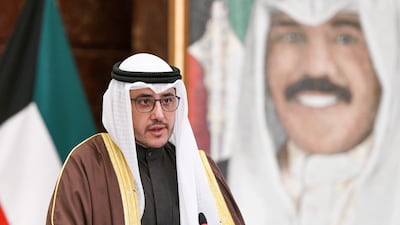Kuwait’s foreign minister survived a vote of no confidence on Wednesday after MPs filed a motion to investigate alleged financial irregularities in his department.
A total of 10 MPs had pushed for the vote to oust Foreign Minister and Minister of State for Cabinet Affairs Sheikh Ahmad Nasser Al Mohammed.
He survived the tough questioning session in Kuwait's Parliament on Wednesday, after 23 members of parliament voted in favour of renewing confidence in the minister out of the 44 politicians who attended the session.
Sheikh Ahmad faced questions from Kuwait's Parliament last Tuesday on a number of issues, including allegations of wasting public funds, breaking laws and failure to protect the country's political and security interests.
A no-confidence vote requires the approval of the majority of MPs to be passed. But it is not uncommon for ministers facing a trust vote to resign before the session.
During last Tuesday’s special session, Sheikh Ahmad reacted to charges raised by one MP, denying the alleged irregularities. He tried to assure the public and MPs that the ministry cared about their welfare and interests abroad.
Sheikh Ahmad is the second minister in the current Kuwaiti government to face a vote of no confidence after Defence Minister Sheikh Hamad Jaber Al Ali Al Sabah survived a motion against him last month, over a number of decisions, including one to allow women to serve in combat roles.
Kuwait's Parliament enjoys legislative power and politicians have been known to challenge the government and royals.
The country has been shaken by disputes between elected politicians and successive governments dominated by the ruling Al Sabah family for more than a decade, with parliaments and Cabinets dissolved several times.


